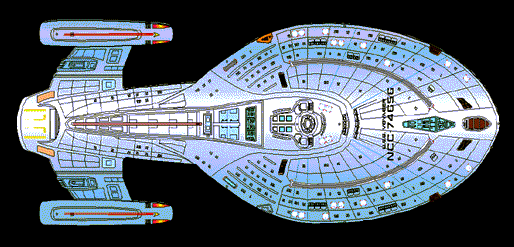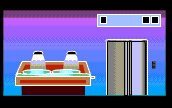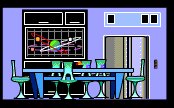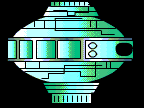![]()
The USS Voyager NCC 74656 is a Intrepid class Starship and only the second ship of this class to be made. Voyager is one of the smaller Starships to be built for normal Starfleet duty. Voyager makes use of the latest Starfleet technology, including Quantium torpedoes, Bioneural gel packs and a Holographic doctor. Voyager was not designed to be away from star bases for long periods of time, so in the Delta quadrant the crew must improvise to survive.


SPECIFICATIONS
Starship Name and Registry: USS Voyager NCC 74656
Starship class: Intrepid class Starship
Length & Weight: 11,130feet, 1.5 million metric Tonnes
Crew Complement: 150
Number of decks: 15
Warp Velocities: Cruising speed of Warp Factor 7 and maximum speed of Warp Factor
9.975
Features: Bionueral gel packs to increase computer response time. Planet-landing
ability. Variable geometry warp nacelles to avoid damage of space. Standard complement of
39 Quantum torpedoes. Enough antimatter to last roughly 3 years.
DEFENSIVE SYSTEMS

Voyager is fitted with four standard shield emitters, one for port, starboard, forward and
aft. Voyager has Upper, Lower and Ventral Phaser strips. There are two Photon Torpedo
launchers; Forward and Aft. Voyager carries a standard deployment of 39 Quantum Torpedoes,
which cannot be replicated. All defensive operations are controlled by the tactical
station on the main bridge.
MAIN BRIDGE

Voyager's bridge is located on deck 1. It can be accessed via a turbolift. Doors lead off
into the Captains ready room and observation deck. The bridge is on two sub levels: the
higher level is where most of the duty stations are located and on the lower level are
Helm, the captains and 1st officers' chairs. To the right of the turbolift there is
tactical. To the left is Ops and other duty stations. Midway on the sides of the bridge
are engineering and science stations. Directly behind the Captain's chair there is the
Mission Ops station, with a schematic diagram of Voyager
CAPTAINS READY ROOM

The Captain's ready room is also on deck 1. It can be accessed via a connecting corridor
or by a door to the left of the Tactical station. Captain Janeway can use it both as an
office and a place to relax in when not on duty.. Three large windows face forward, with a
sofa running underneath. There is a desk and chair for formal duties. The captain can also
order beverages with the replicator that is provided.
BRIEFING ROOM

The briefing room is used by the senior officers to hold meetings. It is again on Deck 1
and can be accessed directly from the bridge. The table is roughly egg shaped with chairs
surrounding it. The captain sits at the north of the table where she is isolated. This is
a common practise in Starfleet, it can also be seen on the USS Enterprise E, DS9 and other
Starfleet vessels. There is a viewscreen to demonstrate plans or as a private
communication point A window faces forward into space.
MESS HALL/NEELIX'S GALLEY

The mess hall is the social centre of the ship and is located on deck 2. Under normal
conditions, the crew would simply order meals out of the replicators and sit down.
However, Voyager must conserve fuel in order to get home. Soon after they got underway, it
was decided that each crew member would get a certain number of rations. There are not
enough rations for full meals so the crew must turn to Neelix. The food is either grown in
the Hydroponics bay or replicated. Neelix then cooks the food in what was once Janeway's
private dining room.
TRANSPORTER SYSTEMS

As with many of Voyager's systems, the transporter system uses Starfleet's latest
technology. The primary transporter systems are located on deck 4 and are mainly used to
beam personnel to and from planets or ships. As with standard Starfleet systems, there are
5 transporter pads in a circle, with once central pad for cargo. The operator stands
directly facing the pads, behind a computer station.
SICKBAY

Voyager's sickbay is one of the most advanced in Starfleet when it was built. Located on
deck 5, the sickbay is comparatively small compared to those in Galaxy class Starships,
because of Voyager's smaller crew. The Emergency-Medical Hologram is integrated into the
sickbay systems. The EMH was originally designed as "a short term emergency
supplement to the medical team", but the Doctor has had to take on the role as full
time Doctor. Holoemitters are located all around sickbay to project the Doctor's program.
There are three biobeds on the right hand side of sickbay.. Straight ahead is a partially
sealed off compartment with the primary biobed. A field can be activated to enclose the
area, if the patient has an infectious illness. There is a window and doorway which leads
to the CMO's office. As well as storage cupboards, there is a medical lab to the far left
of the CMO's office to carry out tests.
Image's
of Voyager's Emergency-Medical Hologram (EMH)
HOLODECK

Located on deck 6, the Holodeck deviates from standard Starfleet design because it is not
connected to the main power grid. Instead, it has it's own generator which is incompatible
with the rest of the ship's systems. While the crew have to conserve energy and ration
their use of the replicators, the holodeck can be used constantly. Although certain crew
members have their 'own' programs, there is a selection of community programs. Created by
Tom Paris, the "Paris-3" program recreates the Chez Sandine tavern in Paris,
Earth. The tavern offers several activities including Pool. This program has been
superseded by Neelix's Paxau resort on Rinax.
ENGINEERING

Engineering is dominated by the warp core, going vertical through the entire engineering
hull. The main entrance to engineering is on deck 11. As you enter engineering you walk
though a short, open passageway. The walls of the passageway are covered with computer
screens and stations. As you approach the core, the passageway opens out, allowing 360
degree access to the core. More stations are present around the perimeter, including the
Chief Engineer. More engineering stations can be found on deck 10.
SHUTTLE BAY

Voyager's shuttle bay is relatively small compared to other Starfleet vessels. The shuttle
has little clearance vertically or horizontally, so precision flying is of the utmost
importance. The shuttle bay must be depressurised before the clamshell door is opened, as
there is no status field to keep an atmosphere. The shuttle bay is located on deck 11, and
also spans into deck 10.
Image's of the Delta Flyer specialised shuttlecraft
Image
of a Voyager Shuttlecraft
ASTROMETRICS LAB

This facility maps out stars and other stellar objects. The information is displayed on a
giant screen. Also known as Stellar Cartography on some ships, the facility has been
upgraded by Seven to produce a quicker route home. Borg technology was used to achieve
some of the upgrades to this and the sensor pallets. The Astrometrics lab can also be used
for receiving some kinds of communication.
![]()
© Copyright Chris Morris 1999
![]()
Email me at [email protected]
This Site is hosted by FortuneCity